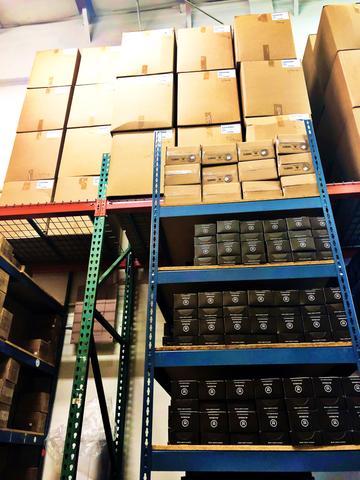Guest Blog Post

McCrea’s Candies is a small business in every sense of the word. It employs a core team of fifteen people. It started in the founder’s kitchen, and the majority of the company is contained within a two-room Hyde Park office building.
The first room is the warehouse. This is where the caramel that McCrea’s creates is stored and packaged and this is ground-zero for distribution. The walls are lined with stacks of boxes filled with varying flavors of candy, and the room smells faintly of sugar and peppermint, a reminder of a possible upcoming Christmas flavor. There are several buckets of “reject” caramels scattered around the room; too large, too small or improperly packaged, these sweets have been deemed unfit to send to customers. Instead, they are eaten by employees (or visiting interviewers).
Upstairs from the warehouse is the office. The same size as the warehouse, the office holds the desks of all seven members of the company’s executive team with boxes of caramels making short cubicle walls to the sides of each desk. Each desk is fiercely individual, adorned with posters about the history of rock music or calendars of Caribbean beaches, but as a whole, the room is indicative of the community atmosphere at McCrea’s. No desk is more than a few steps from any other, and the open floorplan not only allows but encourages collaboration with other team members.
In the wake of the Great Recession, Founder Jason McCrea was laid off from his job as a database developer for Aviva, an insurance company, and turned to one of his great comforts: making sweets. A self-admitted candy addict and lifelong baking enthusiast, McCrea found that the demand among friends and family for the caramels he originally cooked to comfort himself quickly outpaced the speed at which he could make them. This continued until Christmas of 2009 when McCrea realized that there could be something to his caramel-making.
“I wrote a business plan and did a cash flow projection, and I slowly stopped looking for a so-called ‘real job’ and started focusing more on [candy making] because it looked like it had better potential,” McCrea explained.
In the almost ten years since it’s founding, McCrea’s Candies has gone through several major changes, the largest of which was to focus on manufacturing caramel and selling it to retailers nationwide, rather than working as a small candy shop.
“In the very beginning, I thought it would be a small, little walk-in candy shop, but then I realized, that’s not a viable business idea because you have to count on a lot of people coming in and spending their money. Embracing manufacturing is not what I expected, but now it’s a factory.” McCrea said.
The lifeblood of McCrea’s is attending trade shows and making sales or connections there says Julie Ayotte, the company's Director of Sales.
McCrea’s markets itself as a gift company and these shows give them a chance to show off their packaging and product to gift shops, magazines, and websites from across the country. It’s a tiring experience. The people running the show have to be actively selling caramel for as much as nine hours a day, but it’s one of Ayotte’s favorite parts of the job.
She described attending the Atlanta Gift Show where she was giving out samples of caramel. At the show, she gave a sample to one man, and he pocketed it to try later. A few hours later, the man returned to tell Ayotte that the caramel was “the best thing he had ever put into his mouth." He placed an order on the spot. This embodies what Julie Ayotte loves about selling caramel: its all about giving people what makes them happy.
However, above all else, McCrea’s prides itself on having a strong community atmosphere due to its small size. Collaboration is frequent. For example, Ayotte often works with the director of marketing to answer customer questions, but, she says, it can most readily be seen when Christmas comes around.
Because McCrea’s markets itself as a gift, orders spike when the holiday season comes and the whole company turns into a candy-packing operation. Every employee, from intern to CEO, gather alongside temporary packing hires in the warehouse to form an assembly line. Someone starts playing music, someone else orders pizza, and everyone gets to work packing. In a vacuum, it seems like tedious, boring work, but with everyone there, talking joking and having fun, the hours pass quickly, and the caramel stacks grow.
Ayotte sums it up, “It’s the interpersonal relationships you build with your coworkers. Because you’re a small company, you’re working together as a team. I feel like my opinion matters, and that it’s more of a democratic type structure. Everybody works together for the overall success of the company.”
